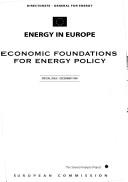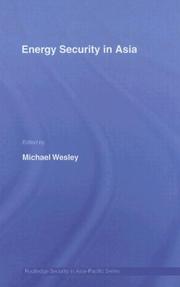| Listing 1 - 10 of 78 | << page >> |
Sort by
|

ISBN: 9282875296 9789282875292 Year: 1999 Volume: Dec. 1999 Publisher: Luxembourg EUR-OP
Abstract | Keywords | Export | Availability | Bookmark
 Loading...
Loading...Choose an application
- Reference Manager
- EndNote
- RefWorks (Direct export to RefWorks)
Relation between energy and economics --- European Union --- Politique énergetique
Book
ISBN: 9282875334 9789282875339 Year: 1999 Volume: Nov. 1999 Publisher: Luxembourg EUR-OP
Abstract | Keywords | Export | Availability | Bookmark
 Loading...
Loading...Choose an application
- Reference Manager
- EndNote
- RefWorks (Direct export to RefWorks)
Relation between energy and economics --- European Union --- Politique énergetique
Book

ISBN: 9789400015388 9400015380 Year: 2022 Publisher: Antwerpen Intersentia
Abstract | Keywords | Export | Availability | Bookmark
 Loading...
Loading...Choose an application
- Reference Manager
- EndNote
- RefWorks (Direct export to RefWorks)
De energiemarkt staat voor ongekende uitdagingen. Klimaatdoelen vereisen binnen een ambitieus tijdspad een grootschalige omschakeling van fossiele brandstoffen naar energie uit hernieuwbare bronnen. De betrouwbaarheid en de betaalbaarheid van de energievoorziening moeten onderwijl verzekerd blijven. Tegelijkertijd zetten geopolitieke factoren de leveringszekerheid en de betaalbaarheid binnen de Europese Unie onder druk. Onder deze omstandigheden zijn vragen over de mate waarin overheidssturing in de energiemarkt wenselijk is, actueler dan ooit. Meer in het bijzonder is dan ook de vraag hoe indringend het toezicht op de energiemarkt ter waarborging van publieke belangen moet zijn en hoe dit moet worden georganiseerd.In dit derde preadvies van de Nederlandse Vereniging voor Energierecht wordt de staat van het toezicht op de energiemarkt opgemaakt: wat is de stand van zaken, hoe zijn we daar gekomen, waar gaat het naartoe? Hebben we dit toezicht in Nederland goed ingericht? En wat zijn eigenlijk de criteria om vast te stellen of dat zo is? Om deze vragen voor een aantal sectoren van de energiemarkt te kunnen beantwoorden, verkennen prof. mr. dr. Femke de Vries en prof. dr. Heinrich Winter in het eerste deel van het preadvies wat ‘goed toezicht’ is. Daarbij schetsen zij een aantal ontwikkelingen in de energiemarkt die het toezicht daarop voor nieuwe uitdagingen stelt. In het tweede deel van het preadvies beschrijven prof. mr. dr. Martha Roggenkamp en mr. Sjoerd Kalisvaart de ontwikkeling van het toezicht op de ontginning van ondergrondse energiebronnen in Nederland door het Staatstoezicht op de Mijnen. Is het Staatstoezicht op de Mijnen, met zijn indrukwekkende historie, ook klaar voor de toekomst? In het derde deel van het preadvies staat de onafhankelijkheid van de toezichthouder op de netwerkgebonden energiemarkt centraal, in Nederland de Autoriteit Consument en Markt.Voorziet de Nederlandse wetgeving wel in de vergaande onafhankelijkheid van deze toezichthouder en exclusiviteit van bevoegdheden zoals die volgens het Hof van Justitie van de Europese Unie door Europese wetgeving vereist? Het vierde deel van het preadvies gaat ten slotte in op het toezicht op de warmtemarkt. De vermindering van de afhankelijkheid van aardgas leidt tot een grotere rol voor diverse vormen van collectieve warmtevoorziening, maar het toezicht daarop is complex. In haar deel van preadvies schetst mr. Helma Kip de ontwikkeling van dit toezicht en legt zij dit langs de lat van de door De Vries en Winter in het eerste deel genoemde criteria voor goed toezicht.
Economic law --- Netherlands --- Politique énergétique --- Concurrence. --- Énergie. --- Pays-Bas
Book
ISBN: 9789279072956 9279072951 Year: 2008 Publisher: Luxembourg EUR-OP
Abstract | Keywords | Export | Availability | Bookmark
 Loading...
Loading...Choose an application
- Reference Manager
- EndNote
- RefWorks (Direct export to RefWorks)
Energy networks are central to the European Union's efforts to ensure the sustainability, competitiveness and security of its energy supply. The EU's policy for trans-European energy networks (TEN-E) has an important part to play in achieving these goals by identifying shortcomings in the energy network and by developing priority routes for electricity transmission and gas distribution. This brochure, which updates a previous European Commission brochure on TEN-E published in 2004, describes how TEN-E projects - along with other measures to develop energy networks as well as research to harness renewable sources of energy - will help Europe to rise to its energy challenges and to support the action plan endorsed by the European Council in March 2007
Relation between energy and economics --- European Commission --- Energy policy --- Energy development --- Politique énergétique --- Energie --- Développement
Book
ISBN: 9781433191350 9781433191367 9781433191374 Year: 2023 Publisher: Lausanne Peter Lang
Abstract | Keywords | Export | Availability | Bookmark
 Loading...
Loading...Choose an application
- Reference Manager
- EndNote
- RefWorks (Direct export to RefWorks)
"This book offers an overarching view of the underlying challenges that the energy transitions pose to interstate energy relations. Geopolitics of energy currently epitomizes one of the principal sources for geopolitical vicissitudes affecting global energy landscapes. The ever-changing global energy architecture, global decarbonization plans and low-carbon technology developments are having deep geopolitical consequences. The extensive and rapid adjustment towards low-carbon energy is unsettling the conventional transnational energy structures, affecting economies and altering energy interstate relations. The geopolitics of the energy transitions is a field in the making, hence the existent academic literature is scarce and limited in scope. Current debates on decarbonization tend to mimic the geopolitics of oil and gas when discussing the stakeholders involved in the energy transitions. Besides, energy transitions tend to be studied at the national level overlooking the interactions at regional and global scales. Most research on the geopolitics of the energy transitions to date has mainly focused on the path to achieve the transitions to low carbon energy systems, and less on the global dynamics and the impacts of those transitions to inter-state relations and energy security. The fundamental question that needs dwelling is: How, and to what extent, will the multiple dimensions of the ongoing energy transitions affect existing fundamental geopolitical issues, and what new dynamics may result from the decarbonization process of the planet? The reasons to organize this publication are many, but among them stand one, which is functioning as the driving force behind this project: to contribute to a broader discussion on the ways in which energy transitions and geopolitics intersect"--
Book
ISSN: 17259177 ISBN: 9789292134655 9292134655 Year: 2014 Volume: 2014/2 Publisher: Luxembourg Off. for Official Publ. of the Europ. Union
Abstract | Keywords | Export | Availability | Bookmark
 Loading...
Loading...Choose an application
- Reference Manager
- EndNote
- RefWorks (Direct export to RefWorks)
Environmental protection. Environmental technology --- Relation between energy and economics --- European Union --- Sustainable development --- European Economic Community countries --- European Union countries --- Energy policy --- Développement durable --- Pays de l'Union européenne --- Politique énergétique --- Economic policy --- Politique économique --- Développement durable. --- Politique énergétique.

ISBN: 0415410061 9780415410069 0203646169 9780203646168 9781134129638 9781134129676 9781134129683 9780415647489 Year: 2007 Publisher: London Routledge
Abstract | Keywords | Export | Availability | Bookmark
 Loading...
Loading...Choose an application
- Reference Manager
- EndNote
- RefWorks (Direct export to RefWorks)
International relations. Foreign policy --- Foreign trade. International trade --- Asia --- Energy policy --- Energy consumption --- Geopolitics --- National security --- Politique énergétique --- Energie --- Politique énergetique --- Géopolitique --- Sécurité nationale --- Consommation --- Politique énergétique --- Politique énergetique --- Géopolitique --- Sécurité nationale
Book
ISBN: 9282893979 Year: 2000 Publisher: Luxembourg EUR-OP
Abstract | Keywords | Export | Availability | Bookmark
 Loading...
Loading...Choose an application
- Reference Manager
- EndNote
- RefWorks (Direct export to RefWorks)
Relation between energy and economics --- European Union --- Energy policy --- Sustainable development --- Power resources --- Politique énergétique --- Développement durable --- Ressources énergétiques
Book
ISBN: 9282893987 9789282893982 Year: 2000 Publisher: Luxembourg EUR-OP
Abstract | Keywords | Export | Availability | Bookmark
 Loading...
Loading...Choose an application
- Reference Manager
- EndNote
- RefWorks (Direct export to RefWorks)
Relation between energy and economics --- European Union --- Energy policy --- Sustainable development --- Power resources --- Politique énergétique --- Développement durable --- Ressources énergétiques --- Politique energetique --- Developpement durable --- Ressources energetiques --- Politique energetique - Pays de l'Union européenne. --- Developpement durable - Pays de l'Union europeenne. --- Ressources energetiques - Pays de l'Union europeenne.
Book
ISBN: 271860137X Year: 1979 Publisher: Paris Galilée
Abstract | Keywords | Export | Availability | Bookmark
 Loading...
Loading...Choose an application
- Reference Manager
- EndNote
- RefWorks (Direct export to RefWorks)
Economic sociology --- Energy consumption --- Energy policy --- Power resources --- Energie --- Politique énergétique --- Ressources énergétiques --- Consommation --- Politique énergétique --- Ressources énergétiques
| Listing 1 - 10 of 78 | << page >> |
Sort by
|

 Search
Search Feedback
Feedback About UniCat
About UniCat  Help
Help News
News